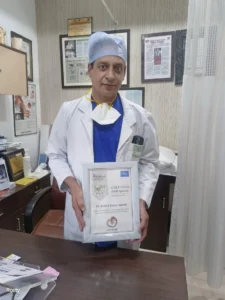Jaipur, Sept 12 — In what is being described as a breakthrough in interventional cardiology, a Jaipur-based cardiologist has successfully carried out a highly complex trans-septal transaortic valve replacement (TAVR) on a patient who was considered inoperable by conventional surgical standards.
The case was presented at the India Valve 2025 conference held in Jaipur on Friday. The patient suffered from bicuspid pinhole severe aortic stenosis, a condition marked by a dangerously narrowed aortic valve. According to the doctor, the standard approach of passing a wire retrograde from the aorta into the left ventricle was not possible because of a strong eccentric jet.

“In this situation, we had no option but to innovate,” the cardiologist said. Instead of the usual route, he advanced the wire from the femoral vein into the right atrium, then punctured into the left atrium, navigated into the left ventricle, and finally reached the aorta. The wire was then snared and externalized through the right femoral artery, effectively traveling across three chambers of the heart before being retrieved.
He noted that this method, though rarely attempted, was the only viable option for success. “This patient was a surgical reject due to prohibitive risk. TAVR offered the only lifeline,” he explained.
The doctor further stated that the procedure was entirely planned and executed by him. “We at FHM are performing TAVR independently. More than 95 percent of hospitals in upper North India still depend on outside proctors for this advanced procedure. This case was fully handled by our team,” he said.
The cardiologist added that he is among the certified independent TAVR operators in the region, underscoring the growing capability of local hospitals to handle complex cardiovascular interventions without external support.


